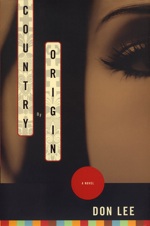Tidbits
-
Country of Origin won an American Book Award, a Mixed Media Watch Image Award for Outstanding Fiction, and the Edgar Award for Best First Novel.
-
While on tour for Country of Origin, Don met some wonderful people who are members of two multiracial organizations that he'd like to promote, Mavin and Swirl.
-
Don about the book and identity: "All the themes about identity and race were on a subconscious level as I wrote the novel, but after many interviews, especially one with Michael Silverblatt of KCRW-FM, I think I figured out what they are. People have called the novel subversive. That's because everything in the book deals with artifice. There are scenes with an indoor beach, love hotels with rooms designed like Swiss chalets, fake trains for closet chikan, or gropers. The characters keep making assumptions about each other, mainly based on stereotypes, and those assumptions keep getting contradicted or stripped away. Everyone is trying to deny or preserve or find their origins, but the point, I think, is that identity is elusive. It can't be easily defined, it can't be appropriated or simulated, and maybe the search for it, at least on an external level, is futile. If you try to base identity on geography or nationality or even race and ethnicity, perhaps that's just another artifice. In the end, I think it can only be found in the tiny circle or principality you build around you--love, children, friends, family. That's what becomes your true country of residence."
-
Some people have asked Don where he got the idea for the novel. Don's father worked for the State Department, and he spent his high school years in Tokyo. He always wanted to write about this milieu of Foreign Service Officers, expats, and spooks. Then he heard about a missing British woman named Lucie Blackman who had worked as a hostess in Tokyo, and he remembered that one of the duties of a consular officer was the welfare and whereabouts of missing citizens. This led him to books by two authors: Anne Allison's Nightwork and Permitted and Prohibited Desires and Lisa Louis's Butterflies of the Night. Both Allison and Louis worked as hostesses—Allison a cultural anthropologist doing an ethnographic study. Their terrific stories and books directly inspired one of Don's main characters, and he learned almost everything he needed to know about hostess clubs and Japan's sex industry from them.
-
Literary influences for the novel were Haruki Murakami, of course, and also Miyuki Miyabe, author of All She Was Worth.
-
For guides and studies of Japan and its people, Don referred to books by Rick Kennedy (and the Tokyo Q gang), Elisabeth Bumiller, Peter Tasker, and Ian Buruma, and countless other volumes and articles; he had access to Lexis-Nexis, sometimes to his great detriment. He even went to Harvard's Yenching Library for three days and scrolled through microfilm for The Japan Times for the entire year of 1980.
-
Don also had the assistance of a fantastic fact-checker, a young woman in Boston named Chikako Atsuta. Tragically, Ako, as she was known to her many friends, died in an accident on August 20, 2004. Memorials have been posted at www.ako.name and on a guestbook.

